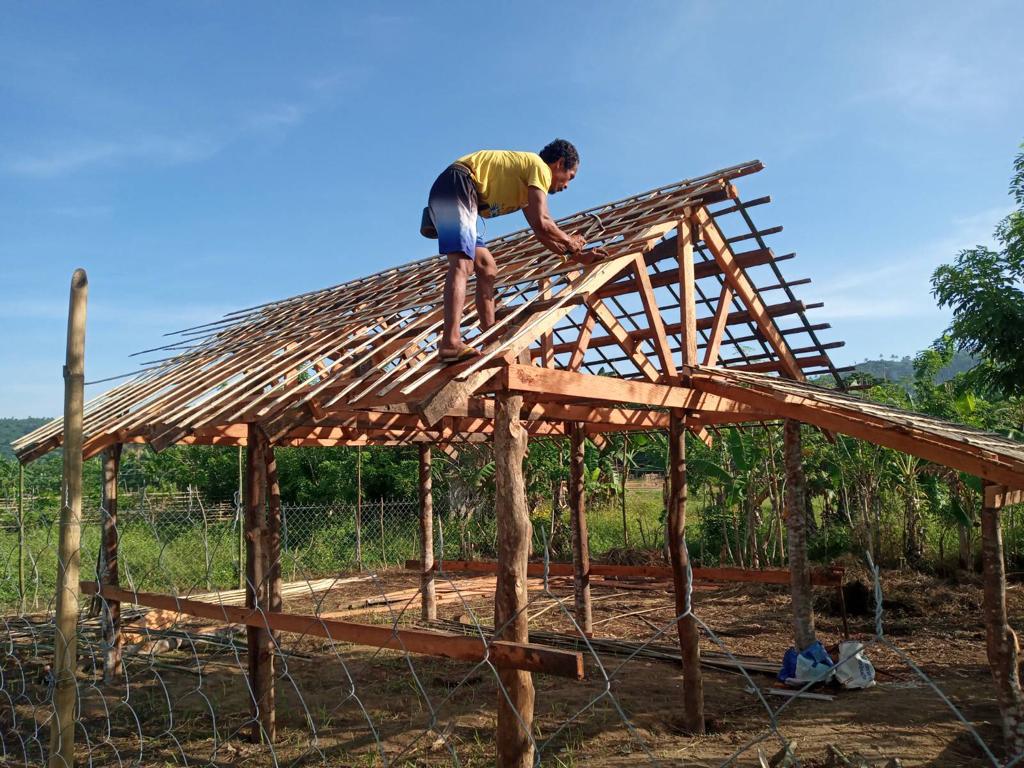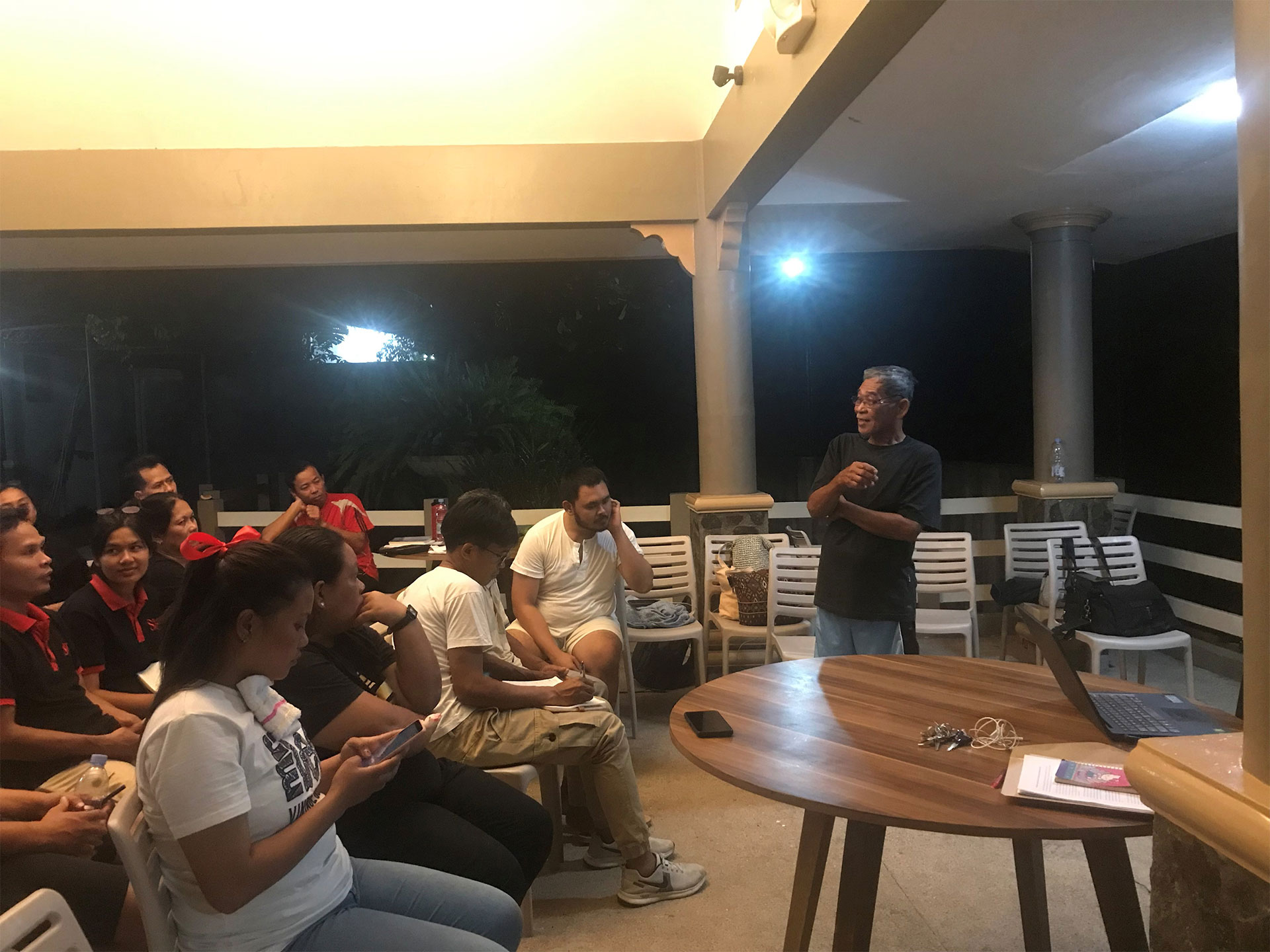BICOL REGION, PHILIPPINES – “When we plant crops to put food on our table and sell them to earn, we are not getting enough. But if we don’t plant, we would certainly get hungry.”
Farmers Wendell and Marie* are husband and wife have lived and worked in the village of Pacol, Naga City, Camarines Sur province (390 kilometres South of Manila) for most of their lives. Like most farmers in the Bicol region, they struggle to make a living due to constant threats of demolition of their homes and land grabbing, on top of difficult farming conditions in the country. High prices of agricultural inputs such as fertilisers and seeds, as well as the excessive importation of agricultural goods, leave farmers like Wendell and Marie with little to no income.
Endowed with rich flatlands, Bicol’s economy relies heavily on agriculture. But rural communities face tremendous poverty and hunger caused by government neglect, oppression, and exploitation at the hands of the local elite.
“During planting, we need to borrow capital from money lenders to buy highly-priced fertilisers and other agricultural inputs. But we would only get low prices for our crops once we sell them. Only the money lenders, resellers of agricultural inputs, and traders are getting richer while we, already poor farmers, are getting poorer,” said Marie.
Marie and her husband are farming on lands being claimed by a businessman who wants to turn it into a subdivision or a commercial complex. Investors, with the support of Camarines Sur’s provincial government, have been converting farmlands into mostly tourist destinations to rake in more profits.
In the recent national elections, political dynasties captured the local seats in the six provinces of Bicol, including Camarines Sur, where poverty remains widespread.
Camarines Sur is the tenth poorest province in the country, with about 34.6% of families (or around 152,300 families) living below the government’s official poverty threshold. Based on official data, Camarines Sur ranked sixth in all Philippine provinces in terms of severity of poverty. In the past three years, the number of poor families in the province swelled by 75% while the severity of poverty worsened threefold.
Small food producers attribute this to their landlessness. They claim that their farmlands are converted into other uses for development projects, in exchange for meager payment for giving up their lands. In 2016, for instance, thousands of farmers opposed the expansion of Naga City airport as it would require at least 135 hectares of farmlands.
“Local politicians from the same family are using their government position to allow land grabbers to take over the rural communities’ farmlands, which for the longest time have been self-sustaining. They convert agricultural lands into business complexes or eco-tourism,” said Jaime*, a peasant organiser in the region.” They call it development when in reality, political clans and their business associates are the only ones who benefit,” he lamented.
Intimidating farmers
Aside from land grabbing, farmers in Camarines Sur and other provinces in the Bicol region also face relentless militarization and human rights violations. In March 2021, state forces started camping near a farming community in Naga City, causing distress among the farmers and their families. They have conduct house-to-house visits, looking for people who are supposedly in their list of “targets.”
In Albay, another province in the Bicol region, two activists were shot dead last year by the police. Jemar Palero of Organisasyon ng mga Magsasaka sa Albay or Albay Farmers’ Organisation (OMA) and Marlon Naperi of the human rights group Albay People’s Organization (APO), both residents of Guinobatan town in Albay province, were spray painting protest art ahead of President Duterte’s final State of the Nation Address (SONA) when they were killed. The police claimed that the activists were “resisting arrest,” even though it was unclear what they were being arrested for.
Farmers and land rights advocates in the region. Vincent*, 57, president of a farmers-fishers organisation in Pasacao town in Camarines Sur, still fears that state agents would come and knock on his door just because he continues to stand for their right to livelihood.
Pasacao has a long shoreline with its brown sand beaches and is known as the “Summer Capital of Camarines Sur.” Residents either earn from fishing or renting small cottages or nipa huts to tourists. Vincent has a small nipa hut, and sometimes he would sail to catch fish that he could sell to the market or for his family’s consumption.
The provincial government is eyeing Pasacao’s potential to be a tourist destination. Private resorts have displaced some fisherfolk and small businesses.

“Military personnel would come here and look for me. For months, they came here every day and stood near my nipa hut with their fingers on the trigger of their guns, as if they were ready to shoot anyone,” Vincent said. “Because our community got frightened of the military presence near our homes and to stop them from coming here every day to intimidate us, I agreed to sign some papers, despite knowing that they might use it as proof that I am a rebel surrenderee,” he added.
Human rights groups claim that the Philippine military has been orchestrating “fake” surrenders to boost the government’s propaganda against the New People’s Army (NPA), which has been waging a civil war for a half-century.
Vincent also shared that whenever military personnel or officials from the provincial government heard that they were seeking assistance or support from civil society organisations, he would be warned against seeking help from others or sharing stories of land grabbing and the threats that they are facing.
“It is natural to be afraid once you are at the receiving end of state-sponsored attacks. These attacks are a disturbance to our work. However, these should not stop us from asserting our rights to land,” said Kilusang Magbubukid ng Bicol or the Peasant Movement of Bicol (KMB) chairperson Bert Autor, also the victim of intimidation and harassment.

Stay to resist
Amid widespread land grabbing and the persecution of land rights defenders, grassroots movements remain steadfast in the struggle for genuine land reform.
“Organising farmers is important in our movement because we have a strong fight if farmers work together in resisting land grabbers. Moreover, farmers should never vacate the farmlands they are defending. They must stay on it and continue to plant as a show of resistance,” said Nora,* 64, from the town of San Felipe, Naga City.
A single mother, farming is her primary source of livelihood. In 2001, a businessman came to their community in Sitio Matiway and wanted to convert their farmlands into a commercial complex. Nora and other farmers resisted the attempt and formed their own organisation to defend their rights. Criminal charges were brought upon them, but eventually, they were able to win the case. With help from the national peasant groups and advocates, they prevented land grabbers from forcefully removing them from their homes and lands.
Unfortunately, most of the 24 families in their community have already left. Only four families, including Nora’s, stayed on and are still awaiting for land titles from the agrarian reform department.
“Leaving the farmlands allows land grabbers to take them. In the eyes of the authorities, leaving diminishes the legitimacy of farmers’ land rights. Instead of leaving, show them that these lands you till are productive, and that your families benefit from the harvest that these lands provide,” Nora emphasised. #
*The names of people in this article have been altered to protect their identity
For more information and updates on the situation and struggle of farmers in the Bicol region, Philippines, visit the Facebook pages of the Kilusang Magbubukid ng Pilipinas (KMP) and Kilusang Magbubukid ng Bicol.
#NoLandNoLife Features discuss recent developments, events, and trends on land and resource grabbing and related human rights issues in the region as well as the factors and forces that drive it. Send us your feedback at nolandnolife@panap.net.








Discussion about this post